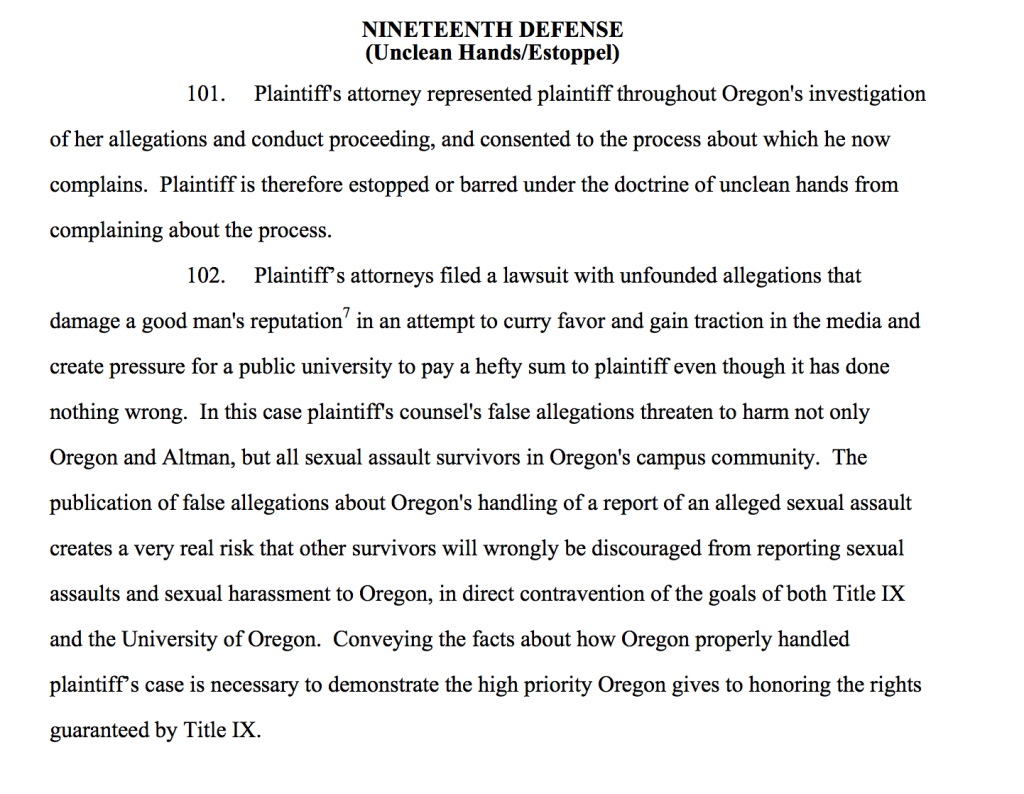Last updated on 08/10/2016
The full docket is here, courtesy of Carl Malamud’s RecapTheLaw. The RG’s Alisha Roemeling has a report here. The intro:
The University of Oregon went to federal court Tuesday to argue that lawsuits filed by three former UO basketball players against the university should be thrown out.
After a three-hour hearing, U.S. District Judge Michael McShane said he expects to take several weeks to review all the materials, including police reports, before rendering a ruling.
The three former players — Dominic Artis, Damyean Dotson and Brandon Austin — all filed lawsuits after they were expelled and banned from campus for up to 10 years for allegedly raping a female student at an off-campus party in March 2014. The players acknowledged a sexual encounter occurred but said the woman consented to it. …
I’ve never been in a Federal courtroom before so I decided to go listen to the arguments. Wow, someone spent a lot of someone else’s money on this building. Not as nice as the Jock Box or Trump Tower, but nicer than, say, PLC.
There were about 20 spectators, including a bunch of law student types and a pile of UO lawyers, including Doug Park. I didn’t see Randy Geller or Mike Gottfredson. Court started 30 minutes late because no one could get the video feed to Artis’s lawyer Alex Spiro in NY working. Eventually they gave up. And you feel bad when you waste 30 seconds of class time getting powerpoint to work – imagine if your students were billing $250 an hour.
In a nutshell, New Jersey attorney Alan Milstein – a self-described expert on sperm donor law – argued that the alleged basketball gang rapists should be able to sue UO because they had a “property and liberty interest” in a college education, which UO took away without due process. He also argued that UO discriminated against the male players by treating them more harshly than it would have treated women – a Title IX violation.
UO was represented by Michelle Barton Smigel of Portland’s Miller Nash firm, one of the lawyers whom Scott Coltrane paid to sue Jane Doe for “damaging a good man’s reputation”:
I get it about everyone having the right to an aggressive defense, but I don’t think that requires an attorney to go along with an idiotic idea like this. Or was it her idea? Maybe Doug Park’s? Coltrane blamed it on his attorneys:
Coltrane, however, criticized the online petition that characterized the UO as having filed a lawsuit against the victim, as opposed to responding to a lawsuit. He said he was advised by attorneys that it’s routine to counter a suit.
“Their suit would have us pay legal fees, and I was told it’s typical when you respond” to also file a counterclaim, he said.
Smigel was assisted by some guy whose main responsibility involved yellow post-it notes. I wonder what we’re paying for those – and if Gottfredson is paying for his share of them? I asked, but UO General Counsel Kevin Reed isn’t going to tell:
Any such information is solidly within the attorney/client privilege, so I am afraid I am precluded from providing you with a substantive answer.
Kevin S. Reed | Vice President and General Counsel
Office of the General Counsel
219 Johnson Hall | Eugene, OR 97403-1226
Milstein came across as a blowhard who hadn’t done his homework. His colleague (Michaels? Williams? Williamson? No one seemed sure) was a bit more informed. Judge McShane kept things moving with good questions. Dominic Artis’s lawyer Alex Spiro eventually got on the speaker phone, but from the cheering it sounded like he was in a sports bar, and the court reporter couldn’t make out whatever he was trying to say. McShane generously gave him a week to get his thoughts in order and mail them in.
In terms of substance, the Second Circuit Court’s July 29th decision in the Columbia University case is obviously going to give the players a lot of help on the Title IX angle. Here’s InsideHigherEd’s take:
A federal appeals court on Friday revived a lawsuit accusing Columbia University of engaging in illegal antimale bias in the way it responded in 2013 to a female student’s allegation of sex assault by a male student.
The suit was filed under Title IX of the Education Amendments of 1972, which bars sex discrimination by colleges receiving federal funds. The finding could be significant not only for those in the case but for many other colleges involved in litigation over their findings on sex assault allegations.
… Pavela said that the decision’s emphasis on Columbia’s possible motivation for siding with female students is likely to suggest a strategy for lawyers who represent male students suing colleges. “More plaintiffs’ attorneys are going to be doing aggressive discovery of our sexual misconduct training materials. Materials written in ways that appear to tilt the proceedings against the accused will be their Holy Grail,” Pavela added.
Fortunately the Ducks are rock solid on the whole sexual misconduct training issue.
He also noted that plaintiffs in Title IX suits can sue for damages and fees for lawyers, making the Title IX approach attractive to many lawyers.
The obviously well-prepared Smigel spent a fair amount of time trying to persuade McShane that the Second District opinion was wrong, which strikes me as a losing game.
Milstein and Michaels argued that Altman’s basketball players should be able to sue UO because they had a right to a college education, which Gottfredson et al then took away from them without due process. Maybe they did, maybe they didn’t, But that’s not why Altman brought them to UO, and that’s not why they are suing UO. Altman recruited them to play ball, UO paid them to play ball, and they are suing UO because UO’s administrators fired them and hurt their basketball careers. So why isn’t this an employment law case?

Be First to Comment